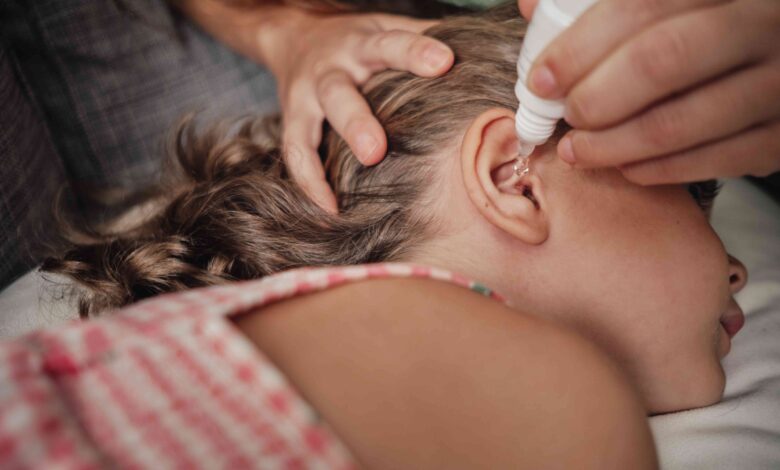How To Treat Your Ear Infection at Home: OTC and Natural Remedies

:max_bytes(150000):strip_icc():format(jpeg)/Health-GettyImages-1423392223-0524b913a2a34ca78442224f4681e630.jpg)
Ear infections often develop due to allergies or an upper respiratory infection. Otitis media (a middle ear infection) is the most common ear infection.
About 80% of children have an ear infection at some point. Adults, especially those with weaker immune systems, can also get ear infections.
Most ear infections clear up on their own, but some require antibiotics or steroid drops. At-home treatments can help reduce ear pain or discomfort.
Over-the-counter (OTC) medicines are available at your local pharmacy or grocery store. They may be a good first option if you’re experiencing any ear pain or discomfort.
Ear Drops
Ear drops can help manage ear pain, especially if they contain an anesthetic (numbing agent) like lidocaine hydrochloride. However, you should talk to a healthcare provider before trying them because not all drops are useful in treating discomfort.
It’s possible to be allergic to ingredients in some drops, like lidocaine. Certain ear drops can even be dangerous if you have a ruptured eardrum or other ear injury.
You should also take prescription ear drops with caution. According to the United States Food and Drug Administration (FDA), certain ingredients in prescription ear drops, including antipyrine, benzocaine, and zinc acetate, may not be safe and effective for everyday use.
Pain Relievers
One of the easiest ways to treat ear pain is with OTC pain relievers like Tylenol (acetaminophen) or nonsteroidal anti-inflammatory drugs (NSAIDs) like Advil (ibuprofen). These can relieve pain and also lower a fever if you have one.
When treating a fever in children, you should avoid aspirin. It can sometimes cause Reye’s syndrome, a rare condition that causes brain swelling and liver damage.
Hydrogen Peroxide
Earwax can sometimes play a role in developing an ear infection.
If you have too much earwax and it’s causing you pain and discomfort, try using a hydrogen peroxide solution to loosen it. Before using this method, have a healthcare provider examine your ear.
Here’s how to use it:
- Mix a 3% hydrogen peroxide solution with an equal amount of warm water
- Put two drops in the affected ear
- Repeat this twice a day for up to five days
- Remove loose earwax with a gentle shower
- Allow the water to enter the ear
- Tip your head, allowing the wax and water to drain out
Avoid putting hydrogen peroxide in your ear if you have a ruptured eardrum.
A warm compress is a drug-free approach for managing pain in various conditions, including ear pain. It can also help increase blood flow to the area and may enable temperature-sensitive nerve endings to block pain signals.
A healthcare provider may advise switching from warm to cold compresses. This can also help manage pain, reduce inflammation and swelling, and encourage blood flow.
Try these steps to make a compress for your ear pain:
- Fold a washcloth and wet it with warm or cool water
- Squeeze out the excess water
- Hold the washcloth over your ear for about 10 minutes at a time
- Rewet the washcloth if it cools down or warms up too much
- Make sure you use a clean washcloth each time
- Repeat this process several times a day
Getting plenty of rest is important for the healing process, regardless of the illness or infection you’re dealing with. Sleep helps boost your immune system, and not getting enough may make fighting illnesses, like ear infections, more difficult.
Sleep Upright
Consider trying a different sleeping position to help alleviate your ear pain and discomfort. An ear infection can cause fluid buildup in the ear, preventing your eustachian tubes, which connect the middle ear to the throat, from draining properly.
This can potentially worsen when you lie down at night. Elevating your head when sleeping may help promote drainage and keep fluid from building up and causing the eardrum to burst.
Staying hydrated is important when you have an infection, as your body needs water to function properly and promote healing.
An ear infection often occurs with mucus buildup due to allergies or an upper respiratory infection. Because mucus is 98% water, staying hydrated can keep mucus thinner and easier to get rid of than thicker, less hydrated mucus. It is also important to drink water if you have a mild fever.
If you’re not a fan of water, you can combine drinking water with other beverages like fruit juice, sparkling water, or tea.
If you prefer a more natural or complementary approach to healthcare, some supplements, foods, and essential oils may help you manage your symptoms. Due to the minimal research on these methods and potential risks, consider speaking to a healthcare provider before adding anything to your diet.
Some natural remedies you can try include:
- Garlic: Studies have shown garlic tablets have antibiotic properties and may help relieve pain.
- Ginger: Ginger has anti-inflammatory properties that may be useful in addressing pain caused by ear infections. Some medical experts recommend applying ginger juice around the outer ear to relieve pain. However, you should avoid getting it in the ear canal because it may cause irritation.
- Olive oil: Olive oil has some antibacterial properties, but there isn’t much evidence that it can soothe an earache or clear an infection. Putting a few drops of warm olive oil in your ear is probably safe, since it is sometimes used to remove earwax.
- Tea tree oil: Tea tree oil is known for its antifungal and antibacterial properties, which some experts believe may help combat infection. However, there is minimal evidence to support this claim, and there’s also some concern that it may be ototoxic (harmful to the ear).
- Apple cider vinegar: Apple cider vinegar is a known remedy for numerous conditions due to its antimicrobial properties. One study found that it may stop bacteria commonly found in ear infections from growing, potentially due to its acetic acid content, which has disinfecting properties.
Ear infections typically resolve without steroids or antibiotics. However, you may still have ear pain and discomfort.
Some home remedies may help relieve discomfort, including OTC pain relievers, warm compresses, upright sleeping, and hydration.
Consider speaking to a healthcare provider before trying any of these remedies.




